
HERE'S WHAT CAT OWNERS NEED TO KNOW ABOUT CHOOSING FURNITURE UPHOLSTERY
Cats may be graceful, but they aren't always graceful. They can scratch furniture and cause other accidents that leave your home looking less than stylish.
In this article we explain what to look for when choosing upholstery for this special situation.
CAN CATS REALLY DAMAGE YOUR FURNITURE WITH THEIR CLAWS?
Yes, cats do have the potential to damage your furniture with their claws. As natural scratchers, cats often use furniture as their preferred scratching posts.
This can lead to unsightly scratches and even tears in the fabric.
DO CATS PREFER CERTAIN TYPES OF FURNITURE TO SCRATCH ON?
Cats do seem to really have preferences when it comes to scratching surfaces. They are more likely to choose objects with a varied texture and vertical stability. This means that furniture with a rough texture or a sturdy construction is more appealing to cats.

WHY SHOULD CAT OWNERS INVEST IN PERFORMANCE UPHOLSTERY?
Investing in performance fabric for your furniture is a smart choice for any cat owner. Cats, by nature, can be quite mischievous and have a knack for finding trouble.
Why look for a high-performance furniture fabric?
Performance upholstery is designed to be more durable and resistant to stains, making it perfect for homes with cats. It offers an added layer of protection, giving you peace of mind knowing that your furniture can stand up to the wear and tear of cat ownership.
TECHNICAL SPECS TO LOOK FOR IN CAT-PROOF UPHOLSTERY FABRIC
Here are three textiles tests that an upholstery choice needs to ace in order to be great for homes with cats:
Tensile strength (ISO 13934-1) and Tearing strength (ISO 13937-3). Fabric tensile properties testing measures the force needed to break a piece of fabric and shows how strong it is compared to other fabrics of its kind. If a fabric is made of fibres that stretch out easily, it will be more likely to show wear and tear after repeated use. The tensile strength test measures the fabric’s strength and percentage of elongation until rupture (mainly for upholstery fabrics). The tearing strength test measures the amount of force needed to tear the fabric (mainly for upholstery fabrics).
Seam slippage (ISO 13936-2). The seam slippage test measures the fabric’s movement at the seam (mainly for upholstery fabrics). Seam slippage is the separation or pulling apart of yarns in a fabric usually along a sewn seam or join. Seam slippage usually occurs on joins that are subjected to heavy load and pressure such as seat cushions and arm rests. Certain furniture styles put more stress on fabric seams such as tub chairs and furniture with a fixed back or seat cushions.
Dimensional stability in fabrics (ISO 3759:2011) Dimensional stability refers to how stable a piece of fabric is over time. If it shrinks or stretches out of shape easily, it won't last as long. That's why this test is important when choosing upholstery fabrics for your home; you want something that'll stand the test of time without shrinking away from its original shape and size. If you stretch the fabric out from its natural state, then it will return back to its original size after being released - this property is what we call "resilience".
WHY ARE FIBREGUARD FABRICS THE BEST CHOICE FOR CAT OWNERS?
FibreGuard fabrics are specifically designed with the needs of pet owners in mind. They are made from high-quality materials that are not only soft to the touch - and stay that way! - but also extremely durable and resistant to wear and tear.
They're woven with a special Stain Free Technology that makes them highly stain-resistant, ensuring that any spills or accidents are easy to clean up.
Finally, those textiles tests that we mentioned above? FibreGuard fabrics passed all of them with flying colours. Learn more here >
This means that even if your cat tries to give your furniture a workout, it will remain unscathed.


 English
English  ελληνικά
ελληνικά
0 comment(s)